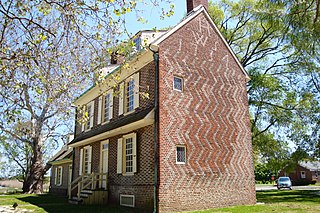
The Hancock House is a historic structure in the Hancock's Bridge section of Lower Alloways Creek Township, Salem County, New Jersey, United States. It was the site of the 1778 Hancock's Bridge massacre. The site is on the National Register of Historic Places.

This is a list of the National Register of Historic Places listings in Columbiana County, Ohio.

Walden is an unincorporated community in Lane County, Oregon, United States. It is about 3 miles (5 km) southeast of Cottage Grove, near the confluence of the Row River and Mosby Creek.

The South Salem Covered Bridge is a historic covered bridge in northwestern Ross County, Ohio, United States. It was built in the 1870s and has been designated a historic site because of its well-preserved historic engineering. Since its construction, it has carried Lower Twin Road over Buckskin Creek in Buckskin Township. The bridge is a wooden Smith truss bridge, built in 1873 according to a design patented by Ohioan Robert Smith in the late 1860s. Eight wooden panels wide, it rests on stone abutments and is covered with a metal roof.
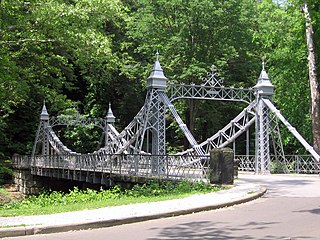
The Mill Creek Park Suspension Bridge is a bridge in Youngstown, Ohio, United States. The 1895 bridge carries Valley Drive across Mill Creek to connect the east and west sides of Mill Creek Park. Following the wishes of Volney Rogers to create fanciful park entrances, Charles Fowler of the Youngstown Bridge Co. designed the structure. The Suspension Bridge is the oldest of six bridges in Mill Creek Park. It measures 86 feet long and 32 feet wide and was listed on the National Register of Historic Places in 1976. It has been called the Silver Bridge, the Cinderella Bridge, the Castle Bridge, and the Walt Disney Bridge. In the summer and fall of 2007, the Suspension Bridge went through a major rehabilitation project to repair the historic structure, restore its visual prominence and improve its structural integrity. The project was coordinated through consultation with the Mahoning Valley Historical Society, Youngstown State University, the Ohio Historic Preservation Office and additional agencies. A Federal Highway Administration Enhancement Grant, secured through the Eastgate Regional Council of Governments, covered 80% of the total project cost. The bridge has been restored to its original splendor, reflecting its history, legacy, aesthetic appeal, cultural prominence and regional character.

The Mull Covered Bridge is a historic wooden covered bridge in the northwestern portion of the U.S. state of Ohio. Built in the middle of the nineteenth century, it is located near Burgoon in Sandusky County. Although it is no longer used to facilitate transportation, the bridge has been preserved and is now a historic site.
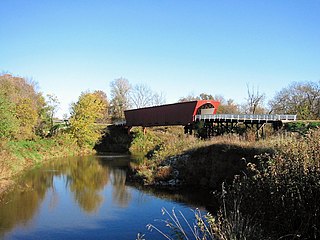
The Roseman Covered Bridge is a historic covered bridge in Winterset, Iowa. It is prominently featured in the novel The Bridges of Madison County, as well as its film adaptation. It was built in 1883 over the Middle River, and renovated in 1992. The Roseman Covered Bridge was added to the National Register of Historic Places in 1976.

The Hogback Covered Bridge is a historic covered bridge near Winterset, Iowa. Named after a nearby limestone ridge, it was built in 1884 by Harvey P. Jones and George K. Foster over the North River on Douglas Township Road. The 106-foot-long (32 m) bridge was designed with a Town lattice truss system. It was built with steel pylons to support the main span.

The Church Hill Road Covered Bridge is a covered bridge in Columbiana County, Ohio. It was originally located over Middle Fork Little Beaver Creek in Elk Township. The bridge was constructed in 1870 and was relocated in 1982 near the Lock 24 Restaurant on Ohio route 154 east of Lisbon, Ohio.

The Warnke Covered Bridge, also known as Warnke Bridge, is a historic covered bridge crossing Swamp Creek in Harrison Township, Preble County, Ohio, northeast of Lewisburg. Built from 1895 to 1896 by Everett S. Sherman, it has a span of 51 feet. It was listed on the National Register of Historic Places in 1976.
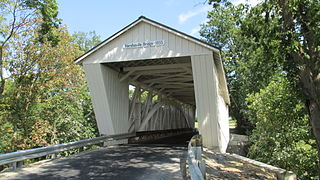
The Harshaville Covered Bridge is a historic covered bridge spanning the Cherry Fork Creek at Harshaville, Adams County, Ohio. Built in 1855, it is a Burr truss bridge with a 110-foot span. It has sheet metal siding, a metal roof and stone abutments. It was listed on the National Register of Historic Places in 1976.

The Ballard Road Covered Bridge is a historic wooden covered bridge in the southwestern part of the U.S. state of Ohio. Built in the late nineteenth century and since bypassed, the bridge has been named a historic site.

The Cataract Falls Covered Bridge is a covered bridge that spans Mill Creek in Lieber State Recreation Area, Owen County, Indiana. Built in 1876 by the Smith Bridge company of Toledo, Ohio, it was at one time one of the most famous and photographed covered bridges in the United States. It is the only remaining one in Owen County.
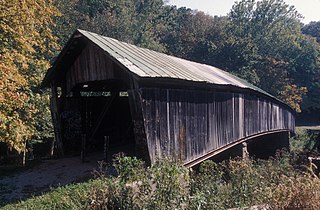
The Ponn Humpback Covered Bridge was a historic covered bridge in the southeastern part of the U.S. state of Ohio. Located near the village of Wilkesville in Vinton County, it bore a name derived from its unusual shape: the bridge was arched in the middle, rather than being flat like a typical covered bridge. Declared a historic site in the 1970s, the bridge had a history closely tied to arson — it was constructed to replace a bridge that had been burned intentionally, and it met its end at the hands of an arsonist.
The Brumbaugh Bridge was a covered bridge in Lane County in the U.S. state of Oregon. Built in 1948, the structure originally carried Row River Road over Mosby Creek near Cottage Grove. It was added to the National Register of Historic Places in 1979 and was subsequently delisted.

Roaring Camp Bridge was a private covered bridge spanning Elk Creek about 6 miles (10 km) west of Drain in the U.S. state of Oregon. Robert Lancaster built the bridge in 1929 to provide road access to his farm, and other local residents used it as well. Roaring Camp was also the name of a roadhouse near the bridge.
The Yatesville Covered Bridge, in Lawrence County, Kentucky near Fallsburg, was built in 1907 and was listed on the National Register of Historic Places in 1976.
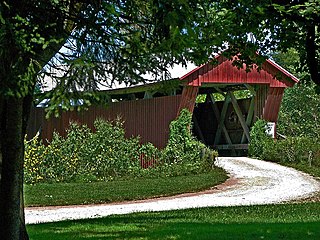
The Johnson Road Covered Bridge is a covered bridge located near Petersburg, Jackson County, Ohio, United States.
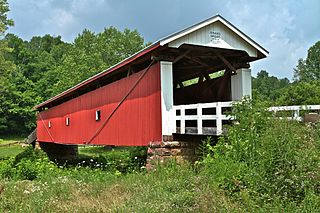
The Rinard Covered Bridge, near Marietta, Ohio, was built in 1876. It was listed on the National Register of Historic Places in 1976.

The Swartz Covered Bridge, near Wyandot, Ohio, was built in 1880. It was listed on the National Register of Historic Places in 1976.





















